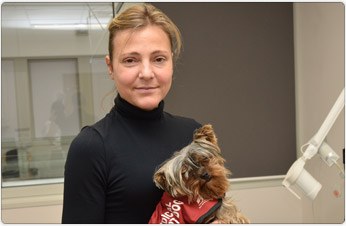Poppy the Yorkshire Terrier has World Diabetes Day licked
14 November 2011
Today is World Diabetes Day, but as on any other day, Chelsea and Westminster Hospital diabetes patient Philippa Copleston-Warren will make sure she has everything she needs to manage her condition including her insulin pump, her glucose testing kit… and Poppy her Yorkshire Terrier.

Philipa has Type 1 diabetes and can quickly develop hypoglycaemia (low blood sugar). Poppy can literally ‘sniff out’ the danger signs of diabetes because she can detect when Philippa’s blood sugar levels are low and alert her to the fact that she needs to take action.
Low blood sugar levels give off a different scent compared to blood sugars within the normal range and Poppy can identify the changes even before Philipa develops any symptoms – and if that’s not clever enough, she has a 100% accuracy rate.
Philippa says: “When my blood sugar drops she sits and stares at me, tries to lick me and then eventually barks. At night she will walk on me and wake up my husband to alert him to my hypoglycaemia.
“Before I had Poppy I had hundreds of occasions of hypo and hyperglycaemia and I have been found unconscious all over the world and scared friends and family many times.
“Since having Poppy I have not had hypos like that when she’s been with me, as she warns me. My life is so much easier now and I can work and travel with much more freedom."
Dr Michael Feher, Diabetes Consultant at Chelsea and Westminster Hospital says: “The NHS in England spends more than £2 billion every year caring for inpatients with diabetes. People with diabetes are more likely to be admitted to hospital and have longer stays than people of the same age without the condition, so reducing hospital admissions is a real priority.
“Philippa’s diabetes is particularly difficult to manage and preventing her from becoming hypoglycaemic can be quite challenging, so Poppy plays an important role in keeping Philippa well and out of hospital.”

